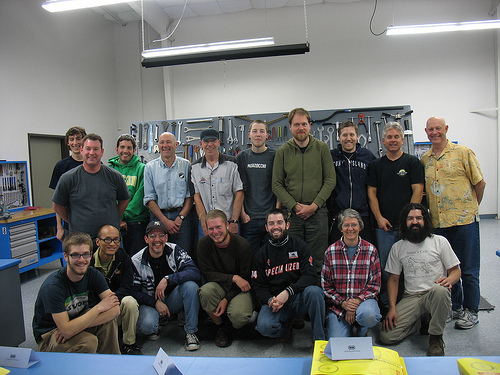In my last post, “Soulcraft and the Art of Motorcycle Maintenance The Demise of Shop Classes,” I discussed Matthew B. Crawford’s recent book, Shop Class as Soulcraft, in which he examines the consequences of the disappearance of high school shop.
Crawford acknowledges that community colleges to some extent are able to “salvage” the lack of high school shop. This is certainly true as you may read in my post, “Green Technology at Your Community College.” CCs are providing an essential service to the workforce. Government studies show that the highest paying jobs, especially green jobs, will come from the CCs. ( Jessica Milano and Conor McKay at the Democratic Leadership Council. San Jose Mercury News.)
Unfortunately, shop classes are also disappearing from CCs. Machine, electronic and industrial technology are going fast. The CCs are being burdened with the enormous task of remediation ignored by the high schools.
In CC remediation lingo, “digital technology” means learning to use a computer and “keyboarding skills” means typing. This is how dumb down the system has come.
High school administrators have a misconception that “trade” students require less math that “professional” students. The opposite is true. A builder or machinist requires more real math than most four-year graduates.
Some CC students come from high school, the military, low earning low prestige jobs, and — as noted by Crawford — some come with advanced degrees to learn a lucrative and satisfying profession. Crawford has a PhD in political philosophy from the University of Chicago, but learned and found satisfaction in motorcycle maintenance.
All students to some degree see high school as a right-of-passage. Most “academically” tracked students see learning as a way to pass college entrance exams; others tracked as “trade” see it as a way to pass the graduation test. Some students do see learning as a way to develop skills.
High school administrators enforce the common notion that there is only one academic road to success. Actually, there are many roads that are more or less taken.
Stan Ovinshisky graduated from high school and took machining courses at a technical school. With this formal education he has made significant contributions to solid-state physics, neurology, chemistry and cybernetics. He also invented an electric car battery. You may recall his appearance in, “Who Killed the Electric Car?”
Microsoft and Apple were founded and are headed by college dropouts. This is almost an exclusive American phenomenon. In most countries, failure to pass a particular test effectively excludes potentially talented individuals from college and successful careers.
While Obama must be applauded for funding education in green technology, Arne Duncan (Secretary of Education) continues on the same failed path of the Bush administration by emphasizing and rewarding instructors for their student’s test scores. If we are to produce a truly technological society, we must teach real critical thinking and have shop classes available at all levels of education.
Photo Credit: Flickr




